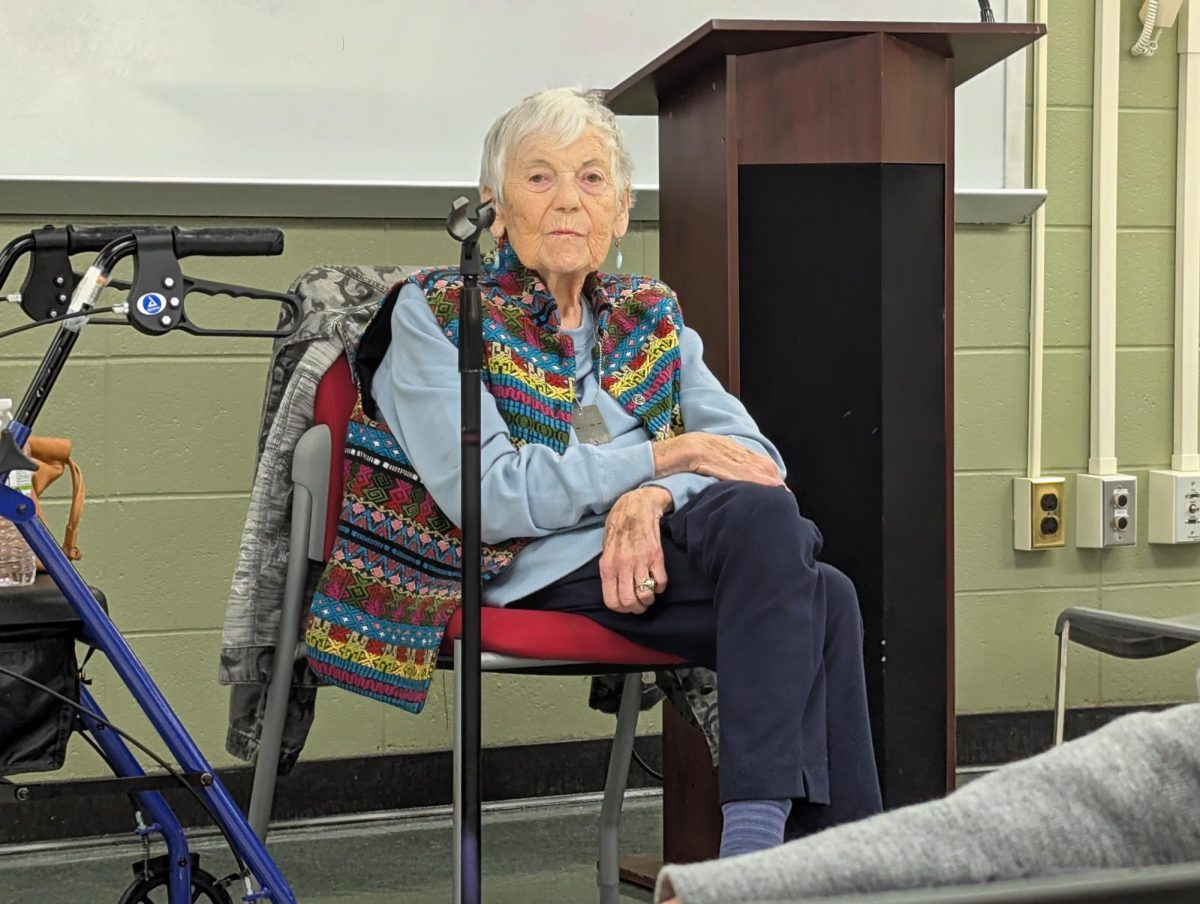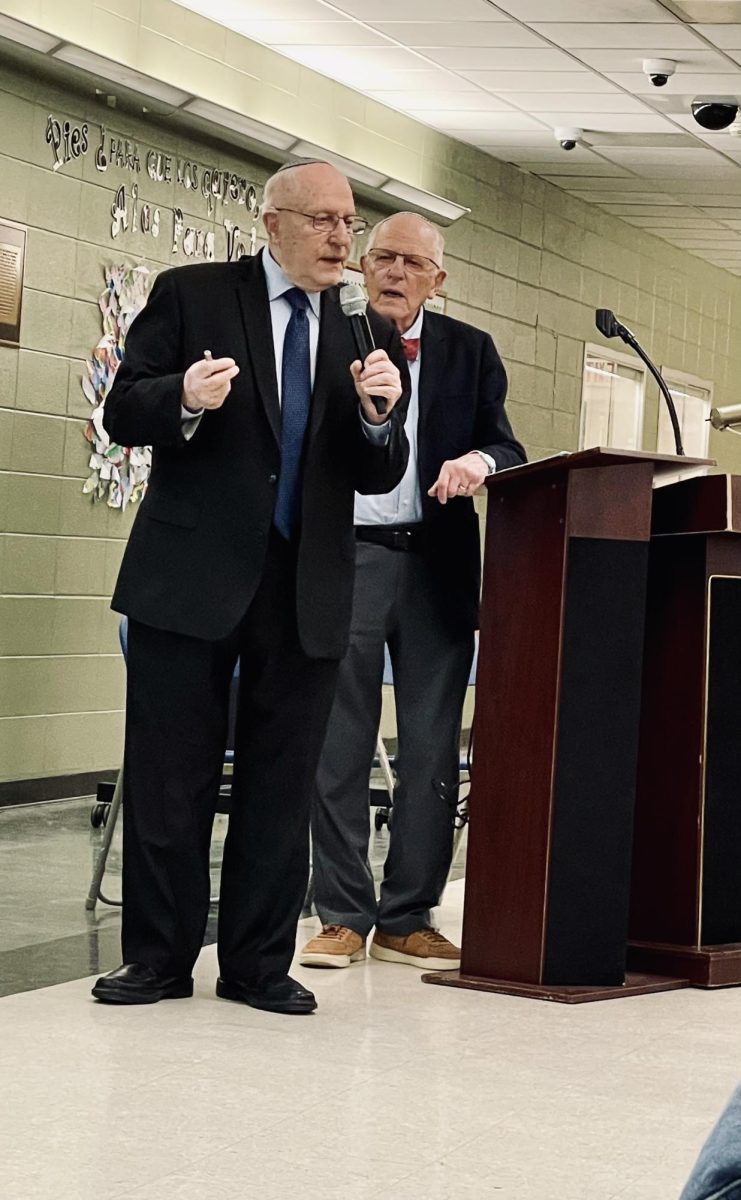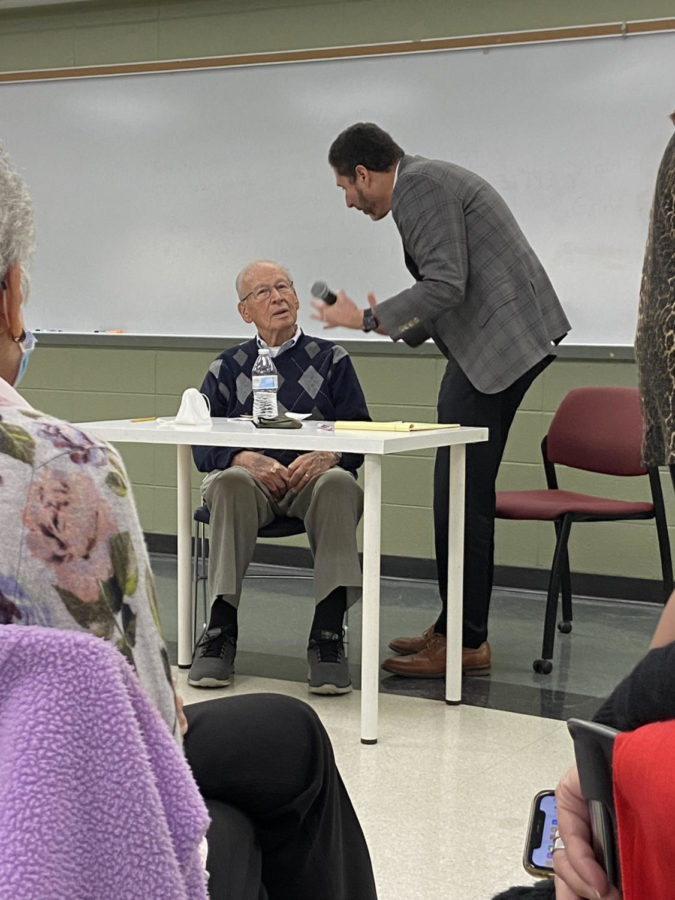Holocaust Survivor Tells His Story to the Next Generation: Mr. Sliberstein’s Story
April 6, 2022
On November 16th, my class and many others had the pleasure of hear the testimony of Michael Silberstein, a Holocaust survivior from Poland who told his story in amazingly clear detail. Helping to better visualize the world in one of the darkest points in human history almost 85 years ago…
Mr Sliberstein began this story by explaining his early life. He was born in Grudziadz, Poland in 1930, having two older sisters (9 and 6) and one older brother (10). His father had a hard time supporting his family before his birth in 1930, but had moved to a new town to find a new job, and found a job in a traditional clothing business.
Until Nazi Germany invaded Poland in 1939, splitting the country between themselves and the Soviet Union (USSR). The family attempted to leave the country afterward, but were trapped.
As the months went on, the Germans began to ration food and put laws against the Jewish population within Poland and eventually, the family was sent to what became known as the Lodz Ghetto, a large closed off area where jews were sent to live within a town or city. Starvation and diseases were rampant, children were not allowed to go to school, and many people were assaulted for minor offenses in the street. His sister began working in a carpet factory, while Mr Sliberstein eventually worked in an electrical plant.
In 1942, selections took place, where he was placed on a truck and taken to an abandoned hospital, where he stayed overnight, surrounded by possibly hundreds of more people. At some point, a nurse approached Mr. Sliberstein’s mother and told her that she had to let Mr. Sliberstein got so that he could possibly escape. The nurse told him to run down a hallway, and through a window to return to the ghetto.
He did as he was told, and returned to his father and siblings, although he never saw his mother again, and found out later on that his mother was sent to an extermination camp, a place designed for the mass murder of it’s prisonsers. She arrived and was eventually killed there.
In 1943, when he was 14 he was selected and sent to Auschwitz-Birkenau, one of the largest and deadliest camps throughout Nazi Germany, over 1.1 million people lost thier lives there, mostly in the camps gas chambers, large rooms that were designed to fill with deadly Zyklon-B gas, suffocating those inside. Mr Sliberstein believes that this trip took about three days, but could have possibly been much longer.
After surviving the initial selections, and becoming a fully fledged inmate, he describes the conditions of the camp as extremely dehumanizing, with more starvation, harsh winters, and more deaths. Mr Sliberstein had to endure these horrible conditions for seven to eight months.
In 1944, the Nazi’s who were in charge of the camp began liquidating the camp as the Russian front began to arrive closer and closer to the camp. So the Nazi’s forced all the able-bodied prisoners on a death march, where if you stopped walking, you were killed on sight. These marches lasted for miles and were done in the coldest time of the year, causing many prisoners to die of hypothermia.
The prisoners in this group were headed to another infamous camp in Austria: Mauthausen. Located in the woods near the village of Mauthausen, Austria. This camp and it’s many sub camps were known for it’s very harsh conditions, sadistic SS soldiers who tortured the prison population, and its infamous staircase that was built by it’s many prisoners, nicknamed, “The Stairway of Death ” by it’s inmates.
Mr. Sliberstein arrived here in early 1945, and was told by inmates to not fall asleep, or else he’d never wake up again, due to the cold. Later on he was given hot coffee as a meal, and due to the dirty conditions of the camp, he used some of the coffee to wash off his body, At this time he didn’t know the location of his family or the war situation, until one day the guards had disappeared from the complex, and on May 8th, 1945 he was liberated by the American Army.
Had to use the help of strangers and friends to help locate his family, found out his sister was in the female camp at Mauthausen for a few years and found each other, and went to England on a children’s transport, without speaking any English. So, he and his sister began to go to school, and Immigrated to the US in 1952. Lots of his aunts, uncles and cousins already lived there.
Afterwards he was drafted into the US Army during the Korean War, and took basic training at a Fort in Georgia, and then went to Alaska for one year, and was discharged in 1955, when he met his wife Lilian. He then ended up working for IBM later on .. They got married in June 1956, and had two sons, Steven and Andrew, Steven has two children.
Mr. Sliberstein says “The will to live kept me going, even after I was liberated” which shows just how strong his will to live truly was, after living almost his entire childhood in fear and horrible conditions, his later life proves to be a testament to the power of human will.





